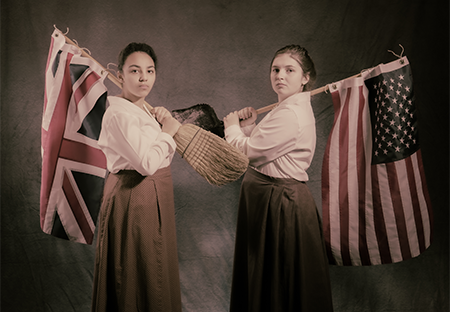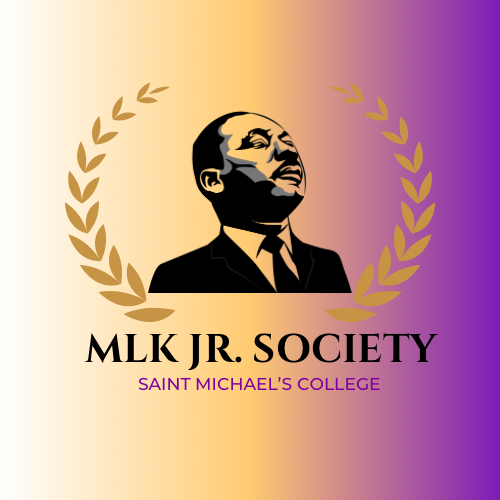Two one-act plays and a suffrage poem set to new music by local musician and composer Tom Cleary place the voices of women front and center in the main spring dramatic production at Saint Michael’s College, running from March 22-25 at 7 p.m. each night in the McCarthy Arts Center Theater.

This photo by Patrick Bohan shows Jojo Carter (left) and Keira Comtois (right), both Saint Michael’s Class of 2026 and members of the spring play cast.
Woman This & Woman That: An Evening of Suffrage Plays revisits a time when their advocacy and determination were catalysts to necessary social change: the right to vote. That same push for change exists today, including with the #metoo movement and outcry over recent U.S. Supreme Court decisions, said director Peter Harrigan of the College’s Fine Arts/Theater faculty.
These current events inspired Harrigan – much as timeless social issues have inspired him in some of his past history-based productions at the College — to amplify the voices of women as a way to engage people in conversation about divisive issues and lead toward action to fight social injustice.
The free-admission performance will include:
- Tennessee Women for the Vote: A Suffrage Play, 1920. The play, written by B. Ayne Cantrell in 2019, centers around a rally for women’s suffrage set in Nashville, Tennessee on June 25, 1920. The rally is 23 days before the Tennessee General Assembly voted to ratify the 19th Amendment to the U.S. Constitution – the final state needed to ratify the amendment, which allowed all American women to vote.
- How the Vote Was Won. The play, written by Cicely Hamilton and Christopher St. John, was first performed at the Royalty Theater in London in 1909. It is a satire set in the modest London home of stodgy Horace Cole and his long-suffering wife Ethel, and it is set at a time when suffragettes have called a women’s strike in response to the government view that “women do not need votes as they are all looked after by men.” As a result, women who previously supported themselves leave their jobs and homes and move in with their nearest male relative – with all their possessions (even pets) in tow. After Horace’s sisters, aunts and distant cousins suddenly turn up at his home, he immediately rushes to Parliament to demand the vote for women.
- Woman This & Woman That. This satiric Suffrage poem from 1910 – a parody of the 1890 poem “Tommy” by Rudyard Kipling – has been set to music for this performance by local jazz and musical theater musician, composer and arranger Tom Cleary. The original work was written by Laurence Houseman, who founded the Suffrage Atelier. The song will serve as the show’s finale.

Tom Cleary
Cast: Keira Comtois ’26, Anna Paradis ’26, James Murphy ’24, Sarah Calvin ’25, Sadie Chamberlain ’25, James Pacheco ’25, Cassidy Mutter ’26, Erika Avellino ’26, James Hunt ’24, Jojo Carter ’26, History Professor Alexandra Garrett, Philosophy Professor Katherine Kirby, Fine Arts Professor John Paul Devlin, History Professor Jolivette Anderson-Douoning, Ginger Baker-Harrigan (dog of Peter Harrigan).
Crew and design (costumes, lights, set): Professor of Fine Arts John Paul Devlin (Scenic and Lighting Design); Tom Cleary (Composer and Musical Director); Ian Underwood ’18 (Sound Design); Alex Hudson (Voice and Dialect Coaching); Mariah Hunt ’24 (Production Stage Manager); Leila Jean Baptiste ’23 (Assistant Stage Manager).
Audience members for this free show can choose seats on a first-come, first-served basis. It is an “UPlift” event for Saint Michael’s students.
Director’s notes:
The veteran director Peter Harrigan is a 1983 Saint Michael’s theater graduate. He said he always looks for scripts with many rich female roles, “since nearly every theater audition on the planet has more women attending than men.”

Peter Harrigan
“I also like finding scripts that find interesting ways to tell stories or reveal history that can create campus discussion across disciplines and reinforce the College’s mission,” he said. “Theater requires that a group of human beings come together in one place to watch other human beings enact narratives that often reflect the very concerns and problems we hoped to escape by going to the theater. I think it is uniquely equipped to engage people in conversation about divisive issues and lead toward action to fight social injustice.”
Harrigan remembers directing and rehearsing an earlier historical play with social justice themes, “Mill Girls,” in the fall of 2017, when “the #metoo movement seem to explode over one weekend in October, and it felt very appropriate to amplify the work of women nearly two hundred years ago who risked so much to create equitable circumstances for themselves and others.”
With more issues of women’s rights coming to prominence in news of recent months, he said, “I thought it was especially important to once again center the voices of women by looking at another time when their advocacy and determination was a catalyst to necessary social change.”
“Once I started doing some digging, I was surprised at the number and variety of plays created as propaganda in the decades-long campaign for votes for Women in the U.K. and the U.S.” he said. “I was also alarmed to see that in places such as Saudi Arabia, women won the right to vote as late as 2015.”
Harrigan said he is thrilled to be working with a cast of not only 10 students, but also several faculty members, including Jolivette Anderson Douoning and Alexandra Garrett of the History Department, Katherine Kirby of Philosophy and Equity Studies programs, “and my close colleague John Devlin (who is also the Scenic and Lighting Designer).”
“Professor Garrett happens to teach Early Women’s History in the United States – and she will join her colleagues with expertise in British History (Professor Jen Purcell and Dean Gretchen Galbraith) in a panel to discuss the history presented in the plays,” he said. The title of this panel is “The Right to Vote: Women’s Suffrage in the UK and U.S.,” on March 9 at 4 p.m. in the St. Edmund’s Hall Farrell Room.
Harrigan said Professors Dan Simmons of political science and Christina Root of English also will study the play with their students in class this semester.

For all press inquiries contact Elizabeth Murray, Associate Director of Communications at Saint Michael's College.






